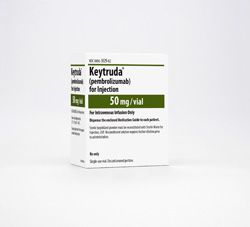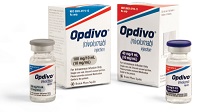 Merck's ($MRK) Keytruda and Bristol-Myers Squibb's ($BMY) Opdivo may be two of the most watched drugs in pharma right now. That's not only because both are breakthrough immunotherapy cancer treatments, but also because both are racing to win additional indications. And when it comes to marketing, each one is playing its advantage.
Merck's ($MRK) Keytruda and Bristol-Myers Squibb's ($BMY) Opdivo may be two of the most watched drugs in pharma right now. That's not only because both are breakthrough immunotherapy cancer treatments, but also because both are racing to win additional indications. And when it comes to marketing, each one is playing its advantage.
Merck, for instance, beat BMS to get the first U.S. approval for treatment of melanoma in September and launched an ad campaign that same month.
In March, however, the roles were reversed when it came to the added indication of advanced squamous non-small cell lung cancer. Opdivo got the first U.S. nod then, while Keytruda, which applied in April, is still waiting. Not surprisingly, the new Opdivo campaign begun in June focuses on lung cancer treatment; so far, Opdivo trails Keytruda in overall revenue. Currently, BMS is also separately running an unbranded campaign called "Ready. Raise. Rise." to boost overall awareness and education of immuno-oncology, featuring high profile "Modern Family" actor Eric Stonestreet."
More cancer indications from both--and likely more marketing--are on the horizon. Merck reported in April that it has more than 85 clinical trials in process across more than 30 tumor types among 14,000 patients, alone and in combination with other drugs. Similarly, BMS reported in March that it is testing Opdivo on "multiple tumor types consisting of more than 50 trials--as a monotherapy or in combination with other therapies" with more than 7,000 patients globally.
Of the two already approved treatments, lung cancer is the much larger opportunity in the next generation PD-1/PD-L1 cancer-fighting class of drugs, with the potential for $21 billion in sales by 2022.
 Marketing cancer drugs is a dicey proposition in general. Too much hype can generate a backlash, while too little publicity means potentially powerful drugs fly under physicians' radar. So, along with each playing to its advantage, both drug efforts stick to focusing on awareness and information.
Marketing cancer drugs is a dicey proposition in general. Too much hype can generate a backlash, while too little publicity means potentially powerful drugs fly under physicians' radar. So, along with each playing to its advantage, both drug efforts stick to focusing on awareness and information.
Ben Hickey, BMS VP of immuno-oncology marketing, characterized his company's print and support services Opdivo campaign as educational.
"Lung cancer is a highly stigmatized, difficult disease to treat with a high mortality rate and limited advancements in treatment over the past decade. With this in mind, BMS developed a print advertising campaign about Opdivo for patients and their families to inform them that for the first time, an immunotherapy is available as a treatment option for adults with advanced squamous non-small cell lung cancer (NSCLC) previously treated with platinum based chemotherapy. Given the aggressive nature of this type of lung cancer, we want to ensure we're doing all we can to educate patients and their loved ones on an available treatment option," he said in an email interview.
Joanne Monahan, Keytruda U.S. regional marketing leader, expressed similar thinking behind Merck's current print, online and social media campaign.
"Immuno-oncology therapies, and the anti-PD-1 class specifically, are relatively new to the treatment landscape for many cancers. With this in mind, our goal is primarily around ensuring that healthcare professionals and treating physicians are aware of Keytruda and are properly informed on the anti-PD-1 efficacy and ability of Keytruda to help fight tumors in appropriate patients," she said in an email interview. "Efficacy has been and remains the No. 1 goal for treatment, which is why we felt it important to ensure physicians were informed of the strong efficacy observed in the trials supporting the current indication in advanced melanoma."
Special Reports: The new drug approvals of 2014 - Keytruda - Opdivo | Top 10 best-selling cancer drugs of 2013